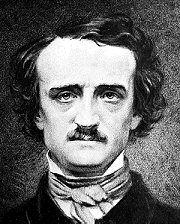
The Knowing Poe website just won a Webby Award, so I imagine it will get a fair, and deserved, amount of attention over the next few months. But the occasion gives me a chance to quote from one of my favorite books, John Irwin's masterful The Mystery to a Solution: Poe, Borges and the Analytical Detective Story:
In creating the detective story, Poe produced the dominant modern genre, and I mean this not merely in the sense, so often cited, that it is the genre with the most titles listed or the most copies printed in any given year, but that it is preeminently the genre of an age dominated by science and technology, an age characterized by mental-work-as-analysis. In the detective scenario and the figure of the mastermind Dupin, Poe gave us at once the most appealing format and the most glamorous mask for mental work and the mental worker. From psychoanalyst to literary critic, from particle physicist to diagnostician, the most (self-)satisfying description of what one does (and thus what one is) seems to fall naturally into the scenario of a knotty problem and its solution - the patient amassing of clues, the false leads, the painstaking analysis, the ultimate triumph - culminating with the observation (hopefully made by someone other than oneself), "Why, you're really more interesting than you look. In fact, you're like a detective." But we should note that in creating the detective story Poe also gave us a cautionary tale about the mastery of mind and our modern scientific world. For Victor Frankenstein and C. Auguste Dupin are products of the same period and the same impulse, except that Dupin is his own monster. Which is to say, he is the first great characterless character, the name for a mental position in an entirely plot-driven scenario, the image of a man of whom one could remark that what he does is the sum total of what he is, a man who foreshadows our present world in which the manipulation of electronic gadgets take the place of thought and in which machines are all too often more interesting than people. And Poe turns the detective story into such a cautionary tale by setting as the task for the mind's exhibition of it mastery the analysis of its own structure. In baiting this task with a narcissistic hook, Poe makes it seem as if the Delphic injunction "Know thyself" had been inscribed on the obverse side of a coin whose reverse bore the inscription "Those whom the gods would destroy, first they make blind."
No comments:
Post a Comment